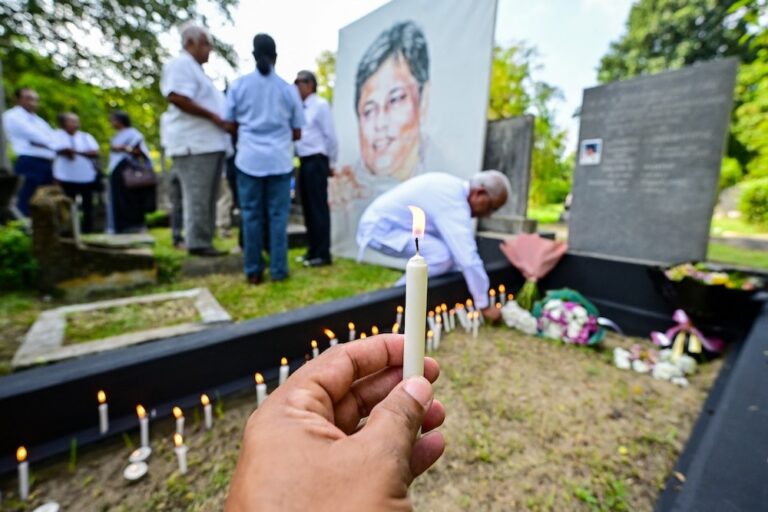(RSF/IFEX) – On 15 May 2003, RSF voiced its concern about a death threat against BBC correspondent Ponnaiah Manikavasagam following the broadcast of his interview with a Tamil separatist leader of the Liberation Tigers of Tamil Eelam (LTTE) on the BBC. A pro-government paramilitary group is believed to be responsible for the threat, which came […]
(RSF/IFEX) – On 15 May 2003, RSF voiced its concern about a death threat against BBC correspondent Ponnaiah Manikavasagam following the broadcast of his interview with a Tamil separatist leader of the Liberation Tigers of Tamil Eelam (LTTE) on the BBC. A pro-government paramilitary group is believed to be responsible for the threat, which came just a few days after two Sinhalese journalists were threatened by LTTE members in Vavuniya, the northern town where Manikavasagam is based.
In a letter to President Chandrika Kumaratunga and Prime Minister Ranil Wickramasinghe, RSF called on the authorities to guarantee the safety of Manikavasagam and all other journalists working in the north and east of the country, and quickly establish the identity of those responsible for the threats. The organisation also stressed that it would be monitoring developments in the case and asked to be kept informed of progress in the police investigation.
RSF is concerned that tensions between the government and Tamil rebels could result in a resumption of violence against journalists. BBC Tamil service correspondent Mayilvaganam Nimalarajan was murdered in October 2000 after receiving death threats from a paramilitary group (see IFEX alerts of 21 October and 2 July 2002, 19 October, 19 and 6 April 2001, 10 November and 20 October 2000). His killers have still not been brought to trial.
Manikavasagam, a correspondent for the Tamil-language daily “Veerakesari” and for the Tamil service of BBC World, received a telephone threat on the evening of 7 May, a few minutes after the BBC broadcast of his interview with Anton Balasingham, the LTTE’s theorist. When he picked up the receiver, he heard a voice say, “You will be killed soon.” After refusing to identify himself, the caller added, “When we shoot you, you will know who we are.”
Using a caller ID system, Manikavasagam said he was able to establish that the call originated from the office of the EPRLF (V) in the northwestern town of Mannar. The EPRLF (V) is a paramilitary group that has supported the government in its war with the LTTE. Manikavasagam immediately filed a complaint with the Vavuniya police. Questioned by police, an EPRLF (V) representative denied any involvement in the threat.
Manikavasagam is concerned for his safety. He has left Vavuniya and gone into hiding. This is not the first time he has been the target of harassment. A former president of the Sri Lanka Tamil Media Alliance and the Vanni Journalists’ Association, he was detained by police in the late 1990s and remained in custody for three months.
The death threat is of particular concern as it is the first such threat in the 14 months of the cease-fire. On 13 May, a member of TELO, a Tamil paramilitary group that is part of the Tamil National Alliance, close to the LTTE, was shot dead in Vavuniya. The TELO has accused the EPDP, another Tamil paramilitary group that has assisted the government in fighting the LTTE, of the shooting. This latest shooting makes the threat against Manikavasagam all the more distressing as it marks a return to violence from Tamil paramilitary groups in Vavuniya.


